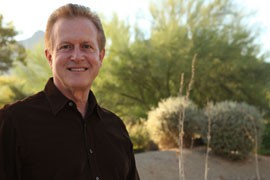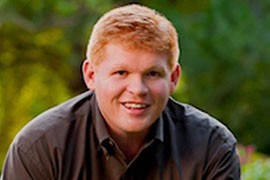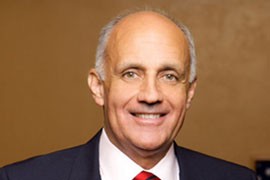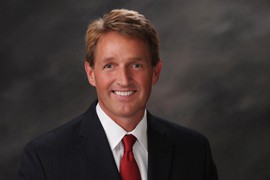Cronkite News has moved to a new home at cronkitenews.azpbs.org. Use this site to search archives from 2011 to May 2015. You can search the new site for current stories.
Race for open Senate seat has potential to be long, costly and bruising
WASHINGTON – For Tempe-based pollster Michael O’Neil, there are elections and then there are “real elections.”
He believes the race this year for the seat being vacated by Arizona Sen. Jon Kyl falls into the latter category.
Take the open seat, add a long primary season with four attractive candidates, in a red state that some believe could be in play in this presidential election year, and you have the elements for a “real election”: costly, long, bruising and with an uncertain outcome.
“Incumbents tend to get re-elected, they tend to have more money raised and it tends to be a foregone conclusion,” said O’Neil, president of public opinion research firm O’Neil Associates. “Without an incumbent, I don’t see it as a foregone conclusion.”
Kyl’s decision to step down means Arizona will not have an incumbent senator running for the first time in 18 years.
It has turned the safe Republican seat into a race both parties are watching closely, and one of only a few that pollsters and political analysts have given Democrats a chance of picking up in November.
Races for an open Senate seat usually feature highly competitive primaries, said Patrick Kenney, a political science professor at Arizona State University. They also tend to be more expensive and prompt higher voter turnouts, both in the primaries and general election.
Arizona’s Aug. 28 primary is also later than most states, making healthy fundraising even more important, Kenney said.
“There’s some research that shows that . . . divisive or hard-fought primaries tend to exhaust campaigns,” said Kenney, the director of ASU’s School of Government, Politics and Global Studies. Arizona’s primary “is so late that it’s hard to restock.”
The major Senate candidates have been stocking up, according to the latest reports from the Federal Election Commission.
Front-runner Rep. Jeff Flake, R-Mesa, had just over $2.5 million on hand at the end of 2011, according to year-end FEC reports. His main GOP challenger, Wil Cardon, a millionaire businessman who is largely self-financing his campaign, had about $1.2 million on hand.
Cardon has vowed not to be outspent and more than 70 percent of his campaign money was his own. He raised about $100,000 in outside contributions in the fourth quarter of 2011, to Flake’s roughly $600,000.
On the Democratic side, former U.S. Surgeon General Richard Carmona reported having $543,521 on hand at the end of the year and former state party chairman Don Bivens had $504,105.
Carmona, a former independent who served under President George W. Bush, is the frontrunner because of his moderate politics and support from national Democrats, O’Neil said.
“Should Carmona get the nomination I think he’s a formidable candidate on the Democratic side,” O’Neil said. “Carmona’s independence makes him a stronger November candidate.”
The Democratic Senatorial Campaign Committee‘s website all but endorses Carmona, saying, “Democrats have a winning candidate for this open seat in Richard Carmona.” Bivens is mentioned only as another Democratic candidate.
But Bivens said he cannot be counted out – nor should Carmona be counted in simply because he was a moderate independent recently turned Democrat.
“Arizona was considered a battleground state for Obama (in 2008) up and until the time John McCain became the (Republican) nominee,” Bivens said. “The notion that Arizona is not ready for Democratic values is nonsense.”
Carmona only declared his candidacy in November but he has picked up numerous endorsements, including one from Dennis DeConcini, the last Democrat to hold an Arizona Senate seat.
“All the campaigns are in a very early stage,” said Andy Barr, Carmona’s spokesman. “We’re getting off the ground here but we don’t believe we’re behind.”
Carmona’s chances may ultimately rest in the hands of President Barack Obama’s re-election campaign, said Kyle Kondik, an analyst at the University of Virginia’s Center for Politics. He said the White House more or less hand-picked Carmona because his appeal as a moderate could help bring out Arizona voters who will also vote for Obama.
Obama campaign staffers have made no secret that Arizona is a state they want to target in 2012, in large part because of a growing Latino demographic. It was the first state Obama visited following his State of the Union address last month to promote his economic agenda.
Arizona figures into the calculus of a broader Democratic strategy to build a Western coalition of blue states, alongside Nevada and Colorado, Kondik said. How competitive Arizona is for Obama will affect how much support the national party puts behind Carmona.
“National Democrats will make the determination here,” Kondik said. “As long as they think Carmona is competitive, they’ll make sure he has enough money.”
The Center for Politics has pegged Flake as the odds-on favorite. But Carmona’s entrance prompted it to downgrade the race from “likely Republican” to “leaning Republican,” making Kyl’s one of three Republican Senate seats Democrats have a chance of flipping in 2012, Kondik said.
He ranks Arizona third for a likely Democratic gain, after seats held by Massachusetts Sen. Scott Brown and Nevada Sen. Dean Heller. But Flake is not worried.
“We’ve got a good ground game and it’s getting stronger,” Flake said. “For Arizona, this is a high-stakes election.”
He laughed at the prospect of the Democratic nominee campaigning with Obama. “I’m not sure too many local candidates will be too excited to campaign with the president around the state,” Flake said.
Both he and Cardon are confident that Arizona will stay red, and neither is worried about the cost of their primary hurting Republican chances in the general election.
“People claiming Arizona is back in play are wrong,” Cardon said. “It’s a securely red state … the reason Jeff Flake is the favorite right now is name recognition, but if you look at both of us, we’re both ahead of the Democrats.”
Cardon cited a November poll by Public Policy Polling that showed him beating Carmona by 2 percentage points, 35-33, and Bivens by 8 points, 35-27. The Democratic polling firm gave Flake slightly better margins: a 40-36 lead over Carmona and a 42-32 advantage over Bivens.
The National Republican Senatorial Committee is not taking sides in the primary, saying only that it is confident that a conservative Republican will win. But its attacks pointedly mention Carmona as the likely Democratic nominee.
And there’s another wild card to throw into the race, along with the open seat and the national attention: Kenney said independent expenditure committees – the so-called “super PACs” that can solicit unlimited donations – could come into play.
Others caution that money isn’t everything.
“Campaign finance is sometimes overstated,” Kondik said. “It’s not like the candidate who raises the most money always wins. If you’re the underdog, you need to raise enough money to get your message out.”
And while the primaries are shaping up as expensive, unpredictable and potentially bloody, all sides say they expect to have enough fight left for the general election.
“I don’t really see the concern,” of a long primary,said Barr, the Carmona spokesman. “I see it one way or another as a good warm-up act.”










